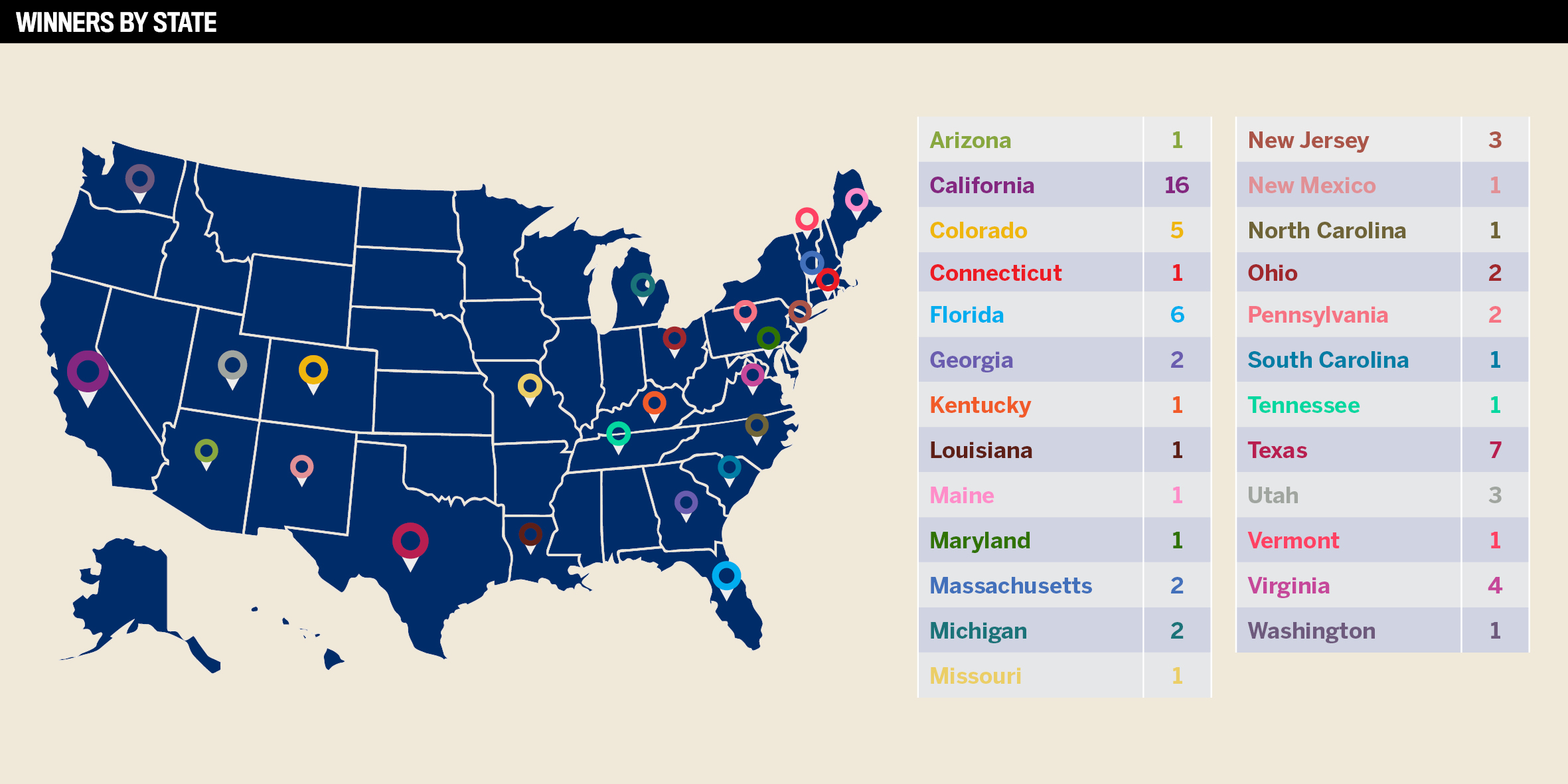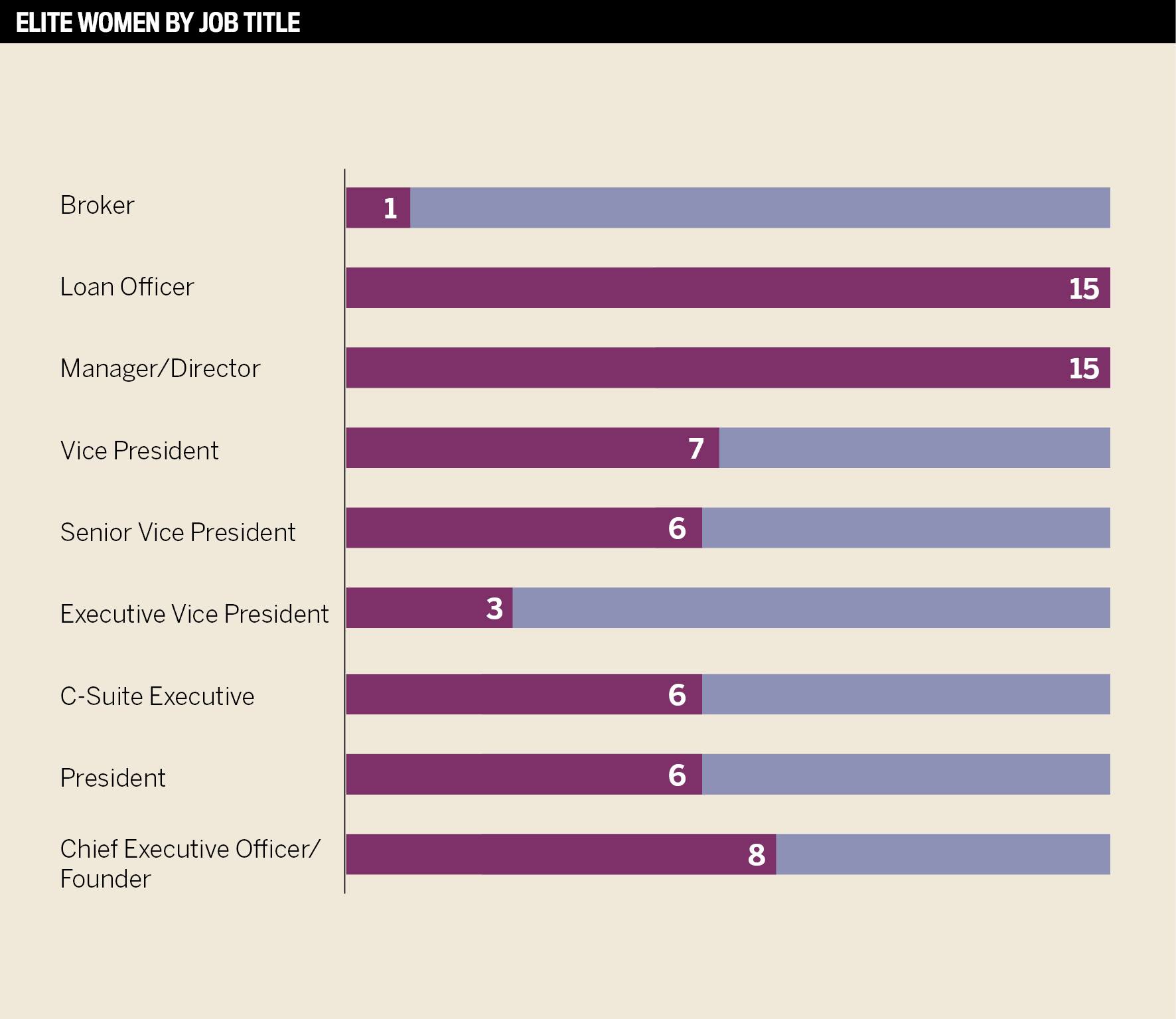

Jump to winners | Jump to methodology
Authoritative yet participative. Demanding yet caring. Professional yet approachable. If these paradoxes sound familiar, then you are probably one of the millions of women trying to succeed in a man’s world.
Women face the constant need to be both tough and nice, and this is where the struggle to be seen as leaders begin. In the corporate space, female leaders are held to higher standards than their male counterparts. Why? Because of ingrained rules that favor what are traditionally considered masculine working styles. When people think of managers or executives, they think of men.
Elite Women think differently. They don’t let unconscious biases trap them in a mould. They break the rules and work to make the mortgage industry more inclusive for all people, no matter their gender identity.
As MPA celebrates the 67 women who made the 2022 Elite Women list, it is timely to take stock of the gender inequality in leadership and how women are continuously challenging societal expectations stacked against them.
“I can’t imagine a workplace where men and women don’t co-exist, co-influence, and co-lead”
Katherine Campbell, Assurance Financial

Elite Woman Katie Sweeney describes herself as someone who has a more traditionally masculine personality – assertive, decisive, and willing to take risks and initiative. But because of these traits, the AIME chief executive is sometimes worried about being judged as too bossy or too opinionated. Often, she has to seesaw between being seen as likable but inconsequential or capable but harsh – a classic case of the “double bind” predicament.
Catalyst, a nonprofit advocating for women’s progress in the workplace, depicted the double-bind dilemma this way: When women take charge, they are viewed as competent leaders but disliked. When women take care, they are liked but perceived as less effective leaders. As a result, female leaders are held to a higher standard of competency and often reap smaller rewards than men. This raises the question, do women have to be masculine to succeed in the mortgage industry?
“I will never shrink myself or water down my personality to make others more comfortable, but I am very self-aware and make an effort to understand the best ways to engage with others based on their needs,” Sweeney says. “Being competitive or communicating directly doesn’t mean I can’t lead with empathy and kindness; it simply takes a little effort.”
On the other hand, Katherine Campbell, chief digital officer of Assurance Financial, leans toward the feminine leadership style, which is more democratic, nurturing, and collaborative. Campbell describes her approach as being based on the “goddess principles,” which she claims have been historically proven by women since the beginning of time.
“I let the men be men, which is why I think I work well with them,” says Campbell. “I am in awe at times with their ability to be more black and white and less gray. I greatly admire that strength, particularly when difficult decisions need to be made. I can’t imagine a workplace where men and women don’t co-exist, co-influence, and co-lead.”
“To be good at maintaining balance in your work and personal life, you must decide what is best for you”
Julie Wink-Davis, Xactus
Delving deeper into gender-based differences, Julie Wink-Davis, EVP of client success at fintech firm Xactus, noticed a common thread in women’s leadership styles: their inherent ability to maintain balance.
“Traditionally speaking, there are certain areas where women are particularly effective – balancing workloads and multitasking. We’re pretty much wired that way. This is especially true if you are a working mother – you have a lot more to balance and don’t have much of a choice,” Wink-Davis tells MPA. “I saw this firsthand when my mom went back to work when I was in 8th grade and saw how she balanced everything – making meals, managing schedules, overseeing schoolwork – all of that.”
While women are naturally good at balancing life, Wink-Davis confessed that it’s not her strong suit and pointed out that there are tradeoffs. “To be good at maintaining balance in your work and personal life, you must decide what is best for you – and oftentimes that means what is best for you right now,” she says.
Another barrier the 2022 Elite Woman faced was the ongoing struggle to get a silent partner to invest in the technology of her former company, Data Facts.
“It was holding the company back, and I could plainly see it. However, once we bought him out, we were able to ensure we continually invested in the company’s technological capabilities so it could grow faster than our competitors,” Wink-Davis shares.
Like Wink-Davis, Campbell followed her instincts and intuition to navigate power structures.
“Power is a funny word,” she explains. “It means very different things to different people. If you accomplish a goal by yourself, you realize you have power. If you accomplish it with a team, you’re empowering. However, the goal itself is the VALUE of power. Do you value power over people or enabling people? What is it that you’re trying to accomplish? Navigating power structures means having a very clear goal of what you’re trying to achieve.”
“You were given a seat at the table for a reason. Own it”
Katie Sweeney, AIME

“We work in an industry that is constantly changing,” says Wink-Davis. “That’s why it is important to stay true to yourself – know what you like to do and what you don’t want to do.
“For those in a hiring position – it’s only natural to want to hire people like us. But at the end of the day, for a company to be successful – you must be open to understanding different people, personalities and perspectives,” she adds.
Nationwide Appraisal Network CEO and Elite Woman Joni Pilgrim shares Wink-Davis’ sentiments. Pilgrim believes there is nothing more important than keeping your finger on the pulse of your people.
“You have to know where the challenges are, where there are efficiency breakdowns, who needs more support or training, who’s ready to grow in their career. When you have a clear vision of where you are going, you know exactly who you need to be at the table with you,” she says. “I’m a big proponent of promoting from within, and when I see the passion and desire and consistency in a team member, then I know that is who I want at my table.”
“Many women know what it feels like to be marginalized, so it’s critical to be mindful of other marginalized groups, especially in the housing industry,” Sweeney adds. “You were given a seat at the table for a reason. Own it.”
Times are changing. Biases are breaking down, and society is starting to shed its unfair perception of women. The less we think of leaders as alpha males, the easier it will be for women to shatter the glass ceiling and for our unconscious minds to recognize them as competent leaders.
Campbell shared a personal mantra she wrote a couple of years ago: “Today, you have nothing to prove. But, every day, there is something to improve.”
Mortgage Professional America invited industry professionals from across the country to nominate exceptional female leaders for the sixth annual Elite Women list. Nominees had to be working in a role that related to, interacted with, or in some way impacted the industry and should have demonstrated a clear passion for their work.
Nominators were asked to describe the nominee’s standout professional achievements over the past 12 months, along with their contributions to diversity and inclusion in the industry and how they’ve given back through volunteer roles and charity work. Recommendations from managers and senior industry professionals were also taken into account.
After a thorough review of all the nominations, the MPA team narrowed down the list to the final 67 Elite Women who have made their mark on the industry.
6th year of MPA’s Elite Women List
80 nominations received
67 companies submitted nominations